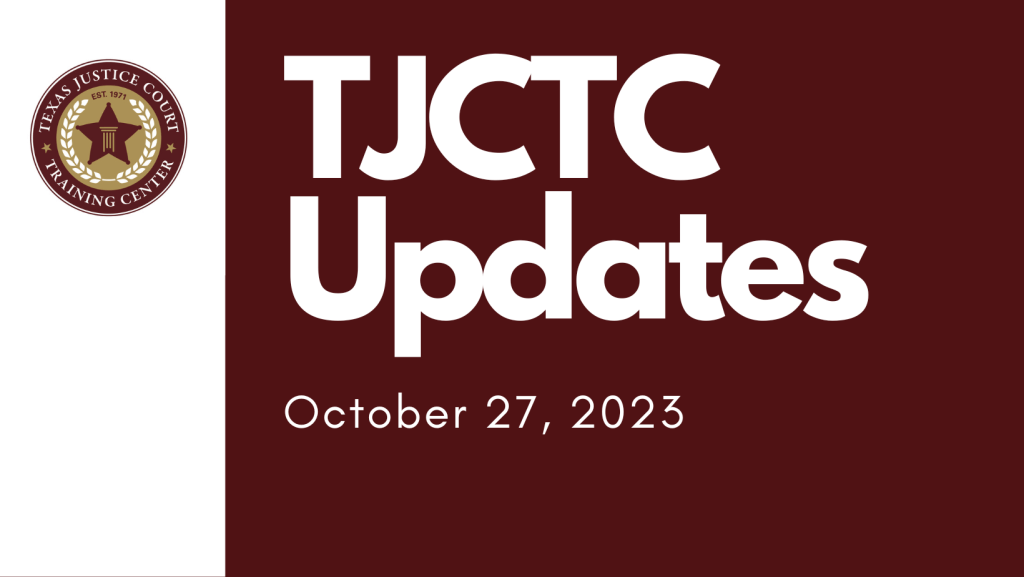Judges, Constables, Deputies, and Court Staff,
We have a lot to share this week – webinars, modules, caselaw, and more. Make sure to scroll all the way down!
TJCTC Webinar – Mental Health Resources for Judges
TLAP helps judges with issues related to substance use or mental health disorders and maintains a list of volunteer judges who are interested in providing support to peers in crisis. This class will feature a discussion with TLAP and the resources available for judges dealing with issues such as vicarious trauma.
Thursday, May 2, 2024 from 2:00 – 3:00 p.m.
Registration link: https://txstate.zoom.us/webinar/register/WN_PcBlRuUQQlatRObdzcHpiw#/registration
Justice Court Section Webinar – Civil Trial and Pretrial Rules and Practice in Justice Courts
Presenter, Rebecca Glisan, TJCTC Director of Curriculum & Staff Attorney
This course will cover some of the specific rules and common issues that arise in justice courts related to jury and bench trials as well as pre-trial motions and hearings. Topics will include continuances, mediation and agreed orders, summary disposition, discovery, evidence, development of the facts of the case, preparing the jury, and more.
Friday, May 17, 2024 from noon – 1:00 pm
Registration link: https://us06web.zoom.us/meeting/register/tZ0uf-qprTwiEt0SfYLrJi12yZMulvcVHzA9%20#/registration
Financial Literacy Month
In addition to stress awareness month, April is also Financial Literacy Month. We put together a list of resources for you to share with your communities on financial literacy. Click on the link below the flier to open in a browser.
Fair Housing Month and Fair Housing Act Module
April is also Fair Housing Month. In recognition of this month, the National Center for State Courts has released a self-paced module all about the Fair Housing Act.
Hybrid Hearings Initiative Resource
The National Center for State Courts recently released this resource after the last few years of researching the best practices for hybrid hearings.
CDL Case Resources
Whether you handle a large caseload of CDL cases or just one every-so-often, the National Judicial College has created a website full of resources just for you. Bookmark https://cdlresources.org/ to prepare for your next CDL case.
Upcoming Court Security Training in Williamson County
Williamson County Justice of the Peace Precinct 3 and the Office of Court Administration are partnering to host an in-person court security training at the end of May. Details are below, and a flier is attached to this email if you are interested.
May 22, 2024 from 9:00 am – 4:30 pm
100 Wilco Way, Georgetown, TX 78626
Fill out this form to RSVP, space is limited.
For questions or more information, please email cherie.vasquez@wilco.org.
Lexipol Webinars
Constables and deputies, are you looking for some free, online training? Lexipol produces some interesting webinars on hot topics that they provide for free on their website. One of the recent issues discussed was use of force. Take a look for yourself – https://www.lexipol.com/resources/webinars/.
Caselaw Updates
Issue: Can officers open an abandoned cell phone at a crime scene to view non-electronic identifying information [example: international mobile equipment identification (IMEI) number] to use to obtain a search warrant for the phone’s digital data?
Holding: Yes. “The police did not have to obtain a warrant to obtain the phone’s IMEI number from its interior SIM tray before securing a warrant to view the phone’s digital contents. The IMEI number allowed the police to describe the phone with the particularity required to obtain the warrant, and to hold otherwise would impede the ability of police officers (and good Samaritans) to attempt to determine a cell phone’s ownership by checking its nondigital identifiers … Further, by fleeing, Martinez abandoned any reasonable expectation of privacy in the IMEI number when he dropped the phone at the crime scene—a place he had no right to be.”
Why did we share this with you? This decision is helpful to both law enforcement officers and magistrates who issue search warrants. It is comprehensive, and if you handle either requesting search warrants or signing search warrants, it is worth a read.
Issue: Did the trial court abuse its discretion by denying the defendant’s request for bail reduction and failing to consider the public safety report?
Holding: No. “After considering all the statutory and judicial factors relevant to setting bail, we conclude that the trial court did not abuse its discretion in denying [the defendant’s] application seeking a reduced amount of bail.” Regarding the public safety report, the Court noted that the defendant did not raise the issue until his appeal, and the Court may not consider issues that were not raised in his application and addressed by the trial court. The Court went on to say that “even if [the defendant] had presented the public safety report issue and preserved it for our review, [the defendant] does not identify how the trial court’s alleged failure to consider the report caused him harm. As such, he has not met his burden to establish his entitlement to the extraordinary relief of habeas corpus.”
Why did we share this with you? This is another case shortly after the Court of Criminal Appeals issued its opinion in Ex Parte Gayosso. The issue of public safety reports in bail cases are a hot topic that we will continue to see cases on.
As always, we look forward to when we see you next!
Thea & the TJCTC Team



